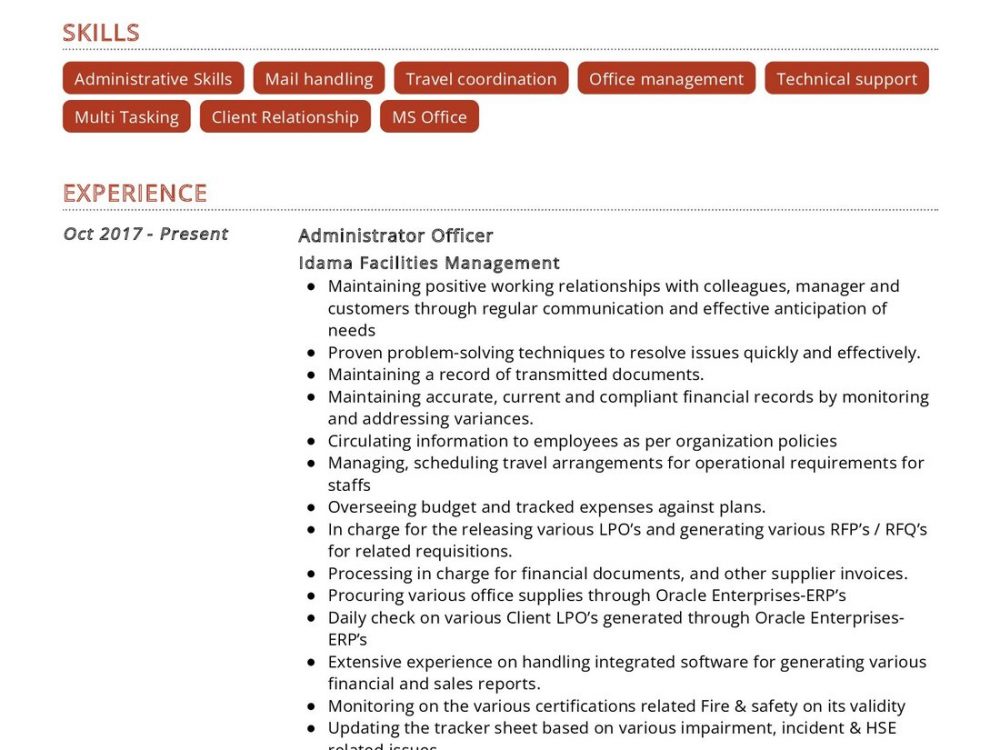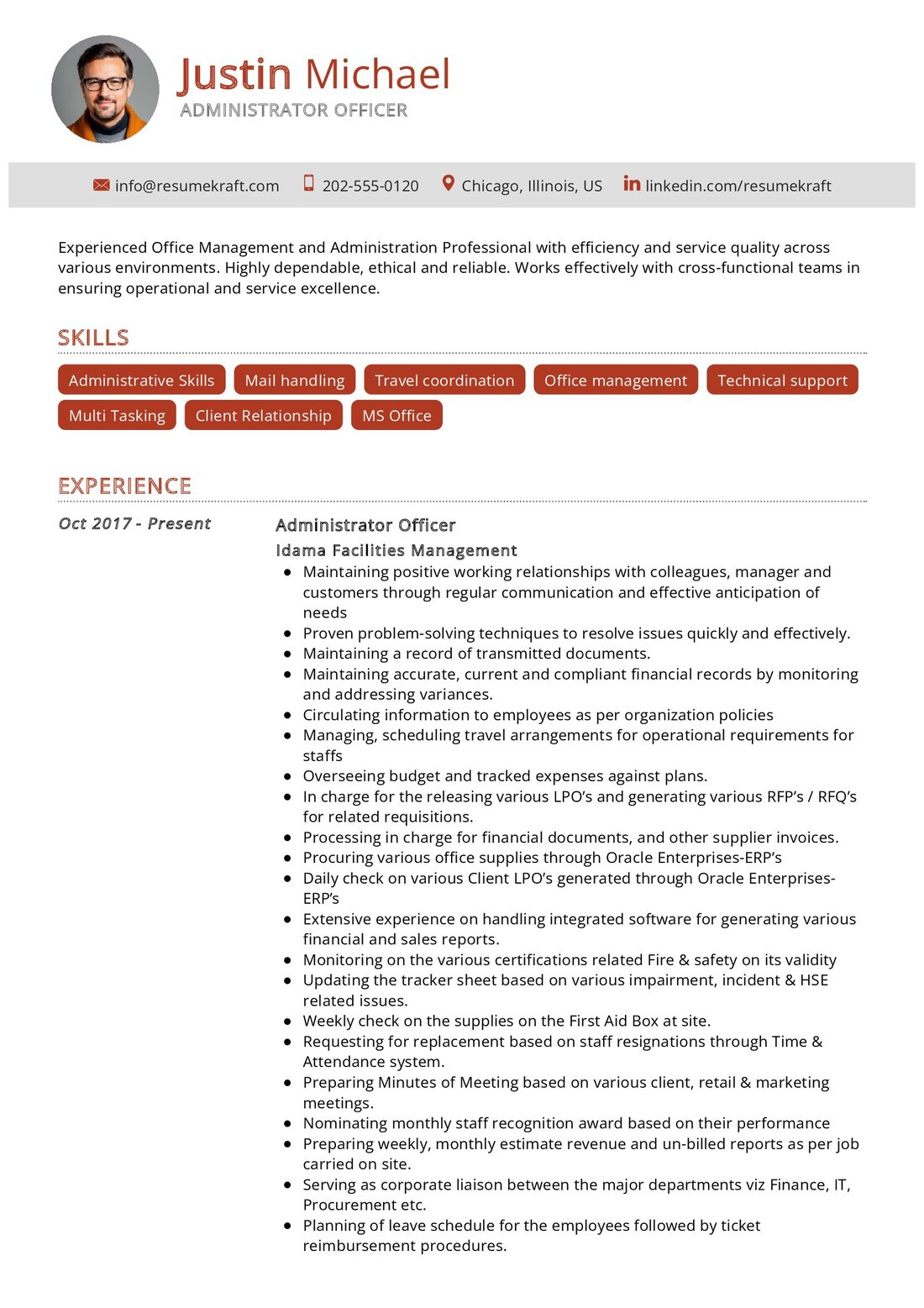What is the Role of an Administrative Officer?
An Administrative Officer plays a crucial role in managing the daily operations of an organization. They are the unsung heroes, ensuring that everything runs smoothly behind the scenes. From managing schedules to handling office supplies and maintaining records, an Administrative Officer is a jack of all trades, mastering the art of multitasking.
Their role is diverse, involving a mix of organizational and communication skills. They are often the first point of contact within an organization, representing the face of the company. Let’s explore the multifaceted role of an Administrative Officer, a position that demands versatility and a proactive approach.
What are the Administrative Officer Job Requirements?
Embarking on a journey as an Administrative Officer requires a unique blend of skills and qualifications. Here’s a glimpse into the basic requirements that pave the way for a career in administration:
- A bachelor’s degree in business administration, management, or a related field.
- Proven experience in an administrative role, showcasing your ability to manage tasks efficiently.
- Strong organizational and time management skills, the pillars of successful administration.
- Excellent communication skills, both written and verbal, to interact with various stakeholders.
- Proficiency in using office software like Microsoft Office Suite and email systems.
- A knack for problem-solving and the ability to think on your feet.
Additional certifications in office management can give you an edge in the competitive job market.
What are the Responsibilities of an Administrative Officer?
The responsibilities of an Administrative Officer are as varied as the colors of a rainbow. From managing office supplies to liaising with different departments, each day brings a new challenge. Here’s a closer look at the myriad responsibilities that come with this role:
- Managing office supplies and ordering new supplies as needed.
- Maintaining and updating company databases.
- Organizing meetings and appointments and managing schedules.
- Preparing reports and presentations and assisting with other projects.
- Handling queries from employees and clients.
- Maintaining a company calendar and scheduling appointments.
- Bookkeeping and assisting with budget preparation.
- Ensuring the office environment is safe and clean.
Each responsibility is a stepping stone towards creating an organized and efficient office environment.
Administrative Officer Resume Writing Tips
Creating a standout resume is like painting a masterpiece. Each stroke, each color, each detail matters. Here are some tips to help you paint a vivid picture of your skills and experiences:
- Highlight your organizational skills, showcasing instances where you’ve managed tasks efficiently.
- Detail your experience in managing office supplies and maintaining databases.
- Showcase your communication skills through examples of liaising with different departments.
- Include any additional certifications or courses in office management.
- Personalize your resume for the specific role, ensuring it aligns with the job description.
Each tip is a brushstroke, helping you create a masterpiece that catches the eye of potential employers.
Administrative Officer Resume Summary Examples
Your resume summary is the opening chapter of your career story. It should captivate the reader, giving them a snapshot of your journey. Here are some examples to inspire you:
- “Dedicated Administrative Officer with 5+ years of experience in managing office supplies and maintaining databases. Proven organizational and communication skills.”
- “Proactive Administrative Officer with a knack for problem-solving and a proven record of managing office operations efficiently.”
- “Versatile Administrative Officer with experience in liaising with different departments and managing schedules. Detail-oriented and highly organized.”
Each summary is a glimpse into your career, showcasing your skills and experiences in a nutshell.
Create a Strong Experience Section for Your Administrative Officer Resume
The experience section is the heart of your resume. It’s where you narrate your career story, highlighting your achievements and experiences. Here are some examples to guide you:
- “Managed office supplies for a company of 100+ employees, reducing costs by 20%.”
- “Maintained and updated company databases, ensuring accuracy and confidentiality.”
- “Organized and scheduled meetings and appointments, managing schedules for 5 executives.”
Each experience is a chapter in your career story, showcasing your journey and achievements.
Sample Education Section for Your Administrative Officer Resume
Your educational background lays the foundation for
your career. Here’s how you can showcase your academic achievements:
- Bachelor’s Degree in Business Administration, XYZ University, 20XX
- Certified Administrative Professional (CAP), International Association of Administrative Professionals, 20XX
Each qualification is a building block, laying the foundation for your career in administration.
Administrative Officer Skills for Your Resume
Skills are the tools in your administrative toolkit. Here’s how you can showcase your skills:
- Organizational Skills
- Communication Skills
- Time Management
- Problem-Solving
- Attention to Detail
- Proficiency in Microsoft Office Suite
- Bookkeeping
- Database Management
Each skill is a tool, aiding you in managing office operations efficiently.
Most Common Mistakes to Avoid When Writing an Administrative Officer Resume
Avoiding common mistakes is like dodging pitfalls on your journey. Here are some mistakes to steer clear of:
- Using a generic template and not personalizing your resume for the specific role.
- Listing job duties without showcasing your achievements and impact.
- Ignoring the importance of a cover letter to accompany your resume.
- Not proofreading your resume, leaving room for errors and typos.
Each mistake is a pitfall, avoid them to craft a resume that stands out.
Key Takeaways for Your Administrative Officer Resume
As we wrap up, let’s recap the key points to keep in mind:
- Personalize your resume, aligning it with the job description.
- Highlight your skills and experiences, showcasing your achievements.
- Include any additional certifications or courses that give you an edge.
- Proofread your resume, ensuring it’s free of errors and typos.
Finally, don’t forget to utilize resources like AI Resume Builder, Resume Design, Resume Samples, Resume Examples, Resume Skills, Resume Help, Resume Synonyms, and Job Responsibilities to create a standout application and prepare for the Administrative Officer job interview.
With these insights and tips, you are well-equipped to craft a resume that reflects your journey, skills, and aspirations. Best of luck on your journey to becoming an Administrative Officer!



